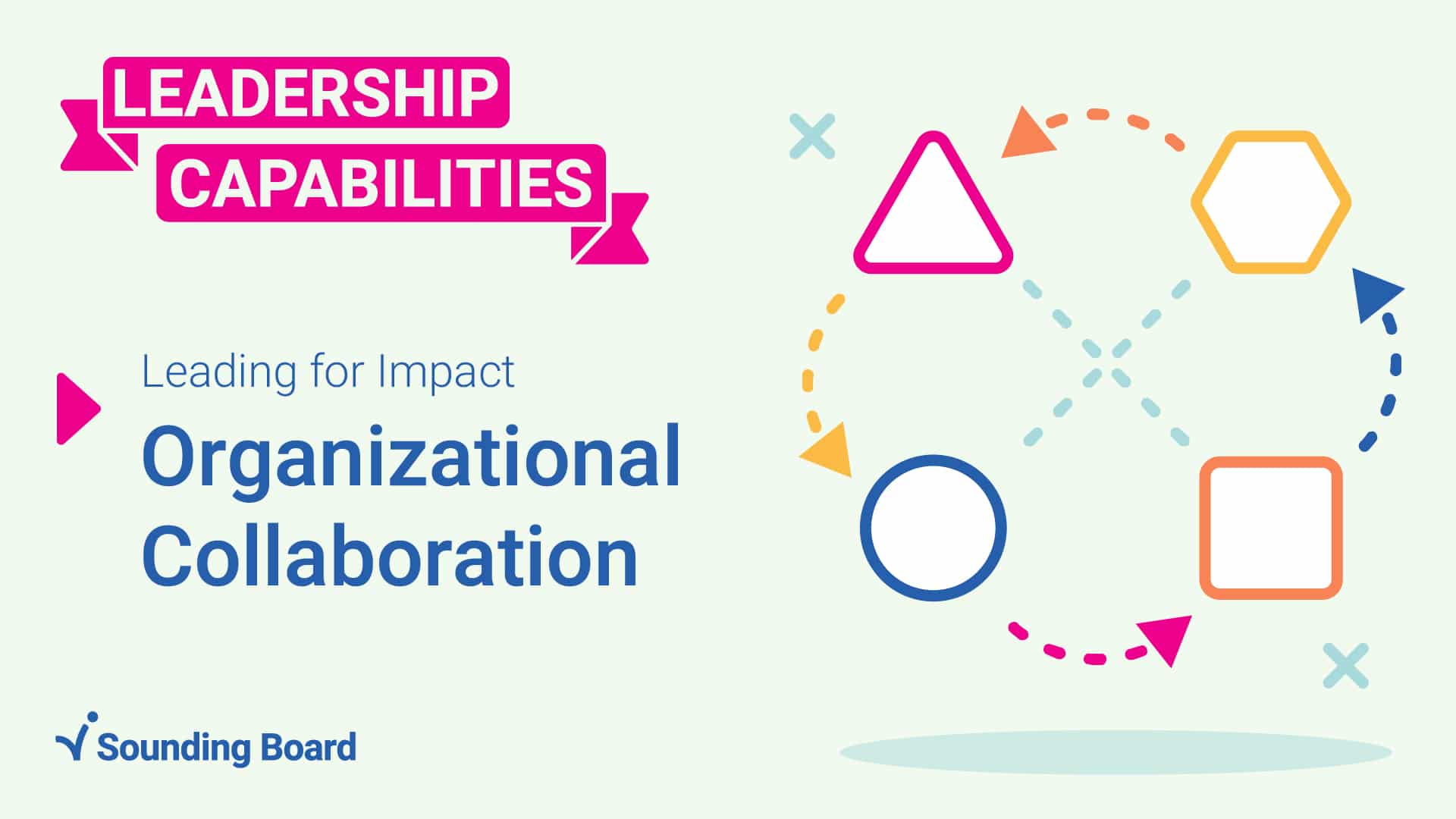This blog is part of a 16-part series focused on what capabilities make a strong leader. Sounding Board has identified 16 leadership capabilities that the strongest leaders possess. These were developed from research-backed leadership theories, leadership competencies used for evaluation from top business schools, and 25+ years of practical coaching application.
The professional world is incredibly dynamic. To keep up, executives must continuously develop and adapt how they manage their teams. In the past, leaders typically worked in silos and handled only the tasks within their domain. Managers today must lean on collaborative leadership styles in order to meet their organizations’ business goals.
What is collaborative leadership?
Collaborative leadership is a modern approach to management where leaders work together across teams, departments, and sectors to make decisions and keep their organizations moving forward. This style of leadership differs significantly from the once-popular top-down approach, where managers made unilateral decisions, which then trickled down to the staff, often without insight into why or how their decisions came to be. This dated approach to management lacks transparency and represents a missed opportunity to be inclusive, build trust, elevate organizational culture, and bolster the bottom line. Collaborative leadership can accomplish all of those things.
It also promotes information sharing and values unique perspectives. Leaders who practice this leadership style recognize the power of diversity in decision making. They know that it leads to increased creativity, innovation, improved problem-solving, and that these things together contribute to greater profit margins. Similarly, a collaborative leadership style extends that sense of unity and cooperation to other leaders and to the workforce in general. Essentially, by leaning into the many benefits of collaboration leaders are able to positively impact organizational culture at large.
As you reflect on your leadership development needs today, it’s imperative to understand that collaborative management is key to creating and maintaining a successful business.
Characteristics of leaders with strong collaboration skills
At its core, being a collaborative leader is about listening to and engaging with others. Sometimes that means solving interpersonal conflict. It’s also about addressing problems with poise and understanding, and in the end, it’s about sharing accountability and credit.
To embody a consistently collaborative mindset, leaders must:
Keep collaboration at the forefront of hiring and management.
Leaders with strong organizational collaboration skills hire the right candidates, and leverage their collective knowledge and skills to make the best decisions for the organization. Collaboration is part of all of their decisions — from hiring to organizational change. They engage the team fully and promote open decision-making. Leaders recognize that without collaboration, they limit transparency and miss out on vital relationships and information.
Never stop learning.
Collaborative leaders are always open to professional development, and leadership coaching is a proven strategy to enhance this valuable trait. These continuously learning leaders commit to their own development by investing time to learn new skills and develop their leadership knowledge with formal coaching, informal or formal mentoring, learning programs, books, conferences, and more. They also recognize the importance of developing their team members by ensuring there are resources to finance meaningful development opportunities. The best collaborative leaders understand that one great way to encourage others is to engage them in development, to demonstrate its value themselves, and leadership coaching is beneficial for leaders at all organizational levels.
Turn conflict into engagement.
Leaders with strong organizational collaboration skills recognize that conflict in the workplace is not always negative. They can help team members work through conflict by helping them see each other’s perspective, thus keeping the team focused on a positive outcome. These leaders do not place blame or instigate further conflict. Instead, they concentrate on finding a collaborative solution where understanding and openness are paramount.
Take accountability, and lead by example.
Leaders with strong collaborative skills step up and deal with issues confidently. They can assess where an error occurred, and start a collaborative effort to resolve issues. Again, they model accountability without passing blame. Then they bring team members together to troubleshoot and forge a path ahead.
Share credit where it is due.
Leaders with strong collaboration skills understand that they don’t have to shine all the time. These leaders speak up to ensure the best performers receive recognition and praise when they earn it. Whether it be through promotions, gift cards, pay raises, or benefits and perks such as extra days off, collaborative leaders understand that they win when their teams win.
It’s important to have strong organizational collaboration skills
It’s not hard to paint a picture of what makes an exemplary collaborative leader. So, why is collaborative leadership one skill everyone should invest time and resources in? What makes it a key asset to include in your hiring and leadership coaching and development efforts?
1. Collaborative leadership improves employee engagement. Employee disengagement is a major challenge facing today’s leaders. Collaborative leadership can help mitigate its effects. Employees want to know they are being heard. When they have collaborative leaders, they have superiors they can trust because these leaders manage as part of the team, not above the team. Their shared sense of purpose increases employee engagement by boosting transparency, opening lines of communication and innovation, and preventing potential power struggles in the business.
2. It creates shorter lead times. When you have strong collaboration skills, you allow everyone to chip in and add their strength to any project, thus improving work quality. Improved quality means fewer resources are needed for review and revision, and more time and money can be spared for strategy, innovation, and closing deals and deliverables.
3. It boosts productivity. Teams put in more effort when the manager is involved in their work and not standing on the sidelines issuing commands. Collaborative leaders go into the trenches with their teams, which boosts their loyalty. They encourage talent to go beyond their assigned duties to help achieve goals. As a result, productivity increases, and business grows.
4. It reduces employee turnover. Consider, hiring an employee can take weeks and cost thousands of dollars. It is essential to find an efficient way to reduce employee turnover. Strong organizational collaboration skills can help you achieve just that because employee satisfaction rates increase when leaders bolster diversity and foster a culture that values idea and knowledge sharing. As a result, employees respond with loyalty and higher discretionary effort, and retention rates increase. The revolving door of talent will slow to a halt.
How to put organizational collaboration skills into practice
We know what they look like, and we know the benefits they bring. But how do you operationalize collaboration skills within an organization?
1. Open up lines of communication. You need to open up communications lines across the organization to put collaboration skills into action. One way to do that is by creating a collaborative organizational culture that encourages employees to speak up. Motivate your team to share their ideas, opinions, and feedback, while creating a safe environment for the team to communicate openly and honestly. However, if you expect honesty from your team, it’s equally important to model these behaviors for them whenever possible.
2. Develop partnerships with your team. Strive to eliminate one of the biggest challenges with the traditional leadership style — barriers between leaders and employees. You might accomplish this by leveraging team-building exercises, get to know each team member individually, and take a more participatory or coaching role and less of a command role. Further, allow team members to engage in team-building activities. Overtime, the subordinate relationship may turn into a strategic and collaborative partnership, which is much more valuable in the long-run.
3. Leadership coaching can help you get there. Collaboration is the backbone of great leadership and the best work environments. As a leader, it is your job to choose and use the collaboration tools that make the most sense within your organization to make this leadership approach effective and profitable. Achieving organizational collaboration is easier said than done. It means creating diverse teams, opening up lines of communication, managing conflict, and maintaining a supportive and open work environment. Leadership coaching can make balancing and executing all of this much easier.
Sounding Board combines technology and coaching to elevate leadership capabilities in organizations. We have a unified platform that makes leadership coaching scalable, measurable, and manageable, all tailored to meet your organization’s needs. Ask for a demo today to learn how we can help you increase your leaders’ core skills and performance.









